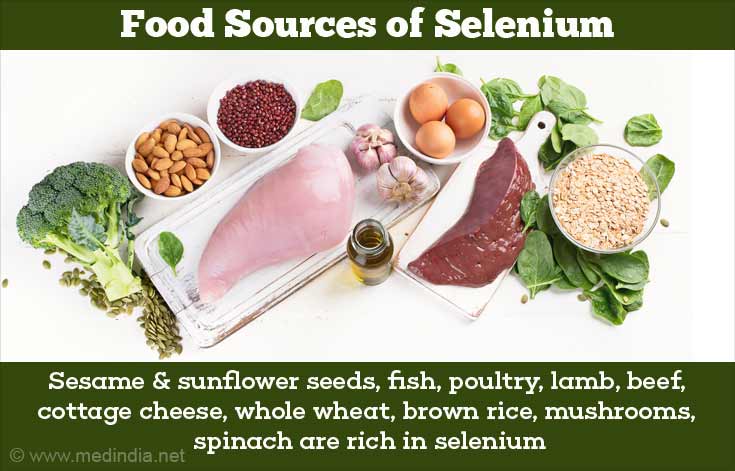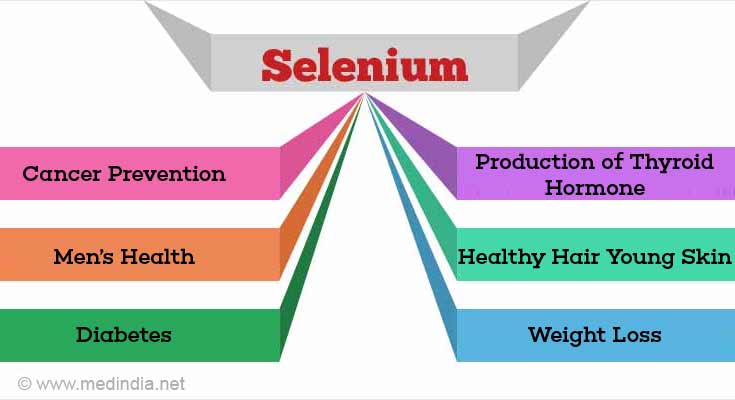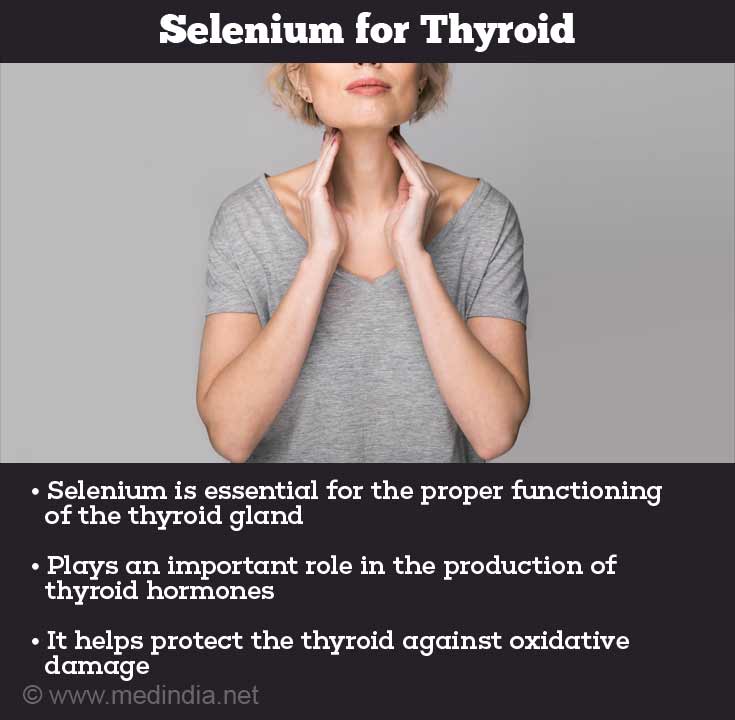Selenium is a trace mineral required by the body for its proper growth and functioning. The soil is the source of the mineral from where it finds its way into plants and other food sources. Natural source of selenium is generally better than supplements. Selenium benefits the human body as it is an antioxidant powerhouse and prevents cell damage.

Natural Food Sources of Selenium
- Brazil nuts
- Sesame seeds
- Sunflower seeds
- Fish like sardine, tuna and Mackerel
- Poultry
- Lamb
- Beef
- Cottage Cheese
- Whole wheat
- Brown Rice
- Mushrooms
- Asparagus
- Spinach
- Oatmeal
Selenium Requirement
The human body requires selenium in very small quantities. Nevertheless the mineral serves several vital functions.
The daily requirement of selenium is easily met through natural food sources but this shouldn’t exceed 400 mcg in adults.
The RDA for adult females is 55 mcg and for adult males 70 mcg.
The requirement of selenium changes to 60 mcg for pregnant women and lactating females need 70 mcg of selenium daily. Selenium requirement differs for children as they grow in age. Children aged 1-3 years need 20mcg, children aged 4-8 years need 30 mcg, and children aged 9-13 years need 40 mcg of selenium daily.
Health Benefits of Selenium
Selenium is extremely important for several vital functions of the human body.

Selenium benefits hair growth by strengthening the hair roots. Protein is needed for good hair health and selenium helps the body to utilize proteins. Selenium also prevents the growth of dandruff, certain fungus growth on scalp and balances hormones — all of which are essential to keep the hair healthy. Selenium is frequently recommended in conjunction with zinc for hair-related problems. Often selenium rich shampoos are popular products on the market that do well.
Selenium is packed with antioxidants, which keep free radicals at bay and thus keep the skin young and healthy. It prevents cell damage and keeps the skin supple and elastic. Selenium is also known to protect skin from cancer and any damage from UV rays.
The thyroid gland contains high concentrations of selenium, which it requires for its optimum functioning. Selenium benefits the thyroid gland by aiding in the production of thyroid hormone. This process generates free radicals, which can harm the thyroid gland if not destroyed in time. For this purpose the thyroid gland produces an antioxidant known as glutathione peroxidase for which selenium is needed. If this free radical damage is not checked in time, then inflammation of the thyroid gland can occur and this can make the gland vulnerable to other problems such as cancer.

Selenium for Cancer Prevention
Selenium being a source of antioxidants can prevent free radical damage and help prevent cancer especially in stomach, liver, thyroid gland, breast and skin.
Selenium deficiency can adversely affect sperm motility and lead to formation of deformed and unhealthy sperm and also cause male infertility. Unhealthy sperm can increase the chances of birth defects and proper selenium consumption prevents this from happening.
Selenium benefits men by improving their fertility and preventing cancer. Selenium can help men living with HIV by minimizing the immune system damage. Men are also at a higher risk for heart problems and adequate selenium consumption can keep the heart healthy.
Selenium reduces the risk of type 2 diabetes. Selenium has to be derived from natural food sources and not through supplements for it to really benefit the body.
Selenium helps in weight management by keeping the heart and the thyroid glands healthy. Heart problems and especially hypothyroidism lead to increased body weight. Proper thyroid functions help the body keep a healthy weight.
Selenium deficiency can occur if the soil of a geographic location lacks selenium content. Deficiency of selenium leads to many health problems related to liver, thyroid gland, kidneys, heart and hair. Selenium deficiency can cause diseases known as Keshan disease.
Keshan Disease causes an enlargement of the heart (Cardiomyopathy) and poor functioning of the heart. It is caused by deficiency of selenium and the presence of a mutated strain of Coxsackie virus. Adding selenium to diet protects people from developing this disease but it cannot reverse the heart muscle damage once it occurs. The disease is named after Keshan County of Heilongjiang province of China, where symptoms of this disease were first observed. A few regions of countries such as China, North Korea, and eastern Siberia may be prone to the disease due to lack of selenium in the soil. It usually affects children and women of child bearing age. Once the disease develops, symptoms of heart failure and lung congestion occur (pulmonary edema).
Selenium deficiency can also cause extreme mental and physical fatigue and muscle pain.
A deficiency of selenium can also have an adverse affect on mental health.
Risks of Excess Selenium from Supplements
New research has shown that selenium supplements might increase the risk of prostate cancer. For this it is advisable that selenium be sourced only from natural food and not through supplements as the body needs it in very less quantity. And selenium supplements are really not required by the body unless your doctor might feel it necessary in very rare cases and then they can guide the patients about the dose and the required time period for the supplement intake.
References:
- Selenium -(http://www.webmd.com/vitamins-and-supplements/lifestyle-guide-11/supplement-guide-selenium)
- About Selenium -(http://whfoods.org/genpage.php?tname=nutrient&dbid=95)
- Selenium & Zinc for Hair Loss -(http://www.e.com/article/293264-selenium-zinc-for-hair-loss/)
- Selenium Benefits for Men -(http://www.livestrong.com/article/543344-selenium-benefits-for-men/)

Comments
Post a Comment